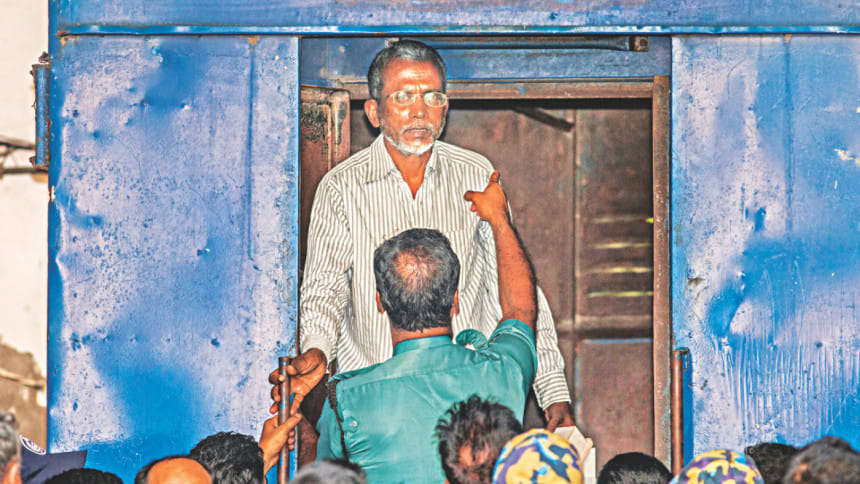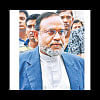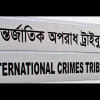Gallows for 4 Razakars for 1971 war crimes

A special tribunal in Dhaka yesterday found five Kishoreganj Razakars guilty of abduction, torture and killings during the Liberation War in 1971 and handed down death sentences to four of them and jail until death to another.
“All the five convicted accused persons by virtue of their membership in local Razakar Bahini were knowingly and culpably engaged in committing the horrendous activities constituting the offences of killing, abduction and other crimes against humanity,” the International Crimes Tribunal-1 said in its judgment.
Gazi Abdul Mannan, 88, commander of a local Razakar camp, Nasiruddin Ahmed, 62, an army captain who was sent to forced retirement, his brother Shamsuddin Ahmed, 60, and Hafiz Uddin, 66, of Karimganj upazila in the district were given death penalty. Azharul Islam, 60, of the same upazila, was sentenced to jail until death.
Only Shamsuddin, a lawyer of a Kishoreganj court, is now in jail while the rest are on the run. The tribunal directed the home secretary and the inspector general of police to take steps to arrest the fugitives with the help of the Interpol, if necessary.
About the execution, the tribunal said the sentences of the fugitives shall be executed after their arrest or when they surrender before the tribunal. The convicted criminals can be executed either “by hanging or shooting” as decided by the government, it added.
About their atrocities, the tribunal said: “Their deliberate and barbaric acts and conduct in respect of the events narrated in all the charges framed rather force us to conclude that they, the potential members of Razakar Bahini, which was truly a locally formed 'bunch of hooligans' had carried out deliberate criminal acts...”
“Their role, act and conduct they had shown in accomplishing the crimes, already established, have proven them to be notorious human beings,” said Justice Anwarul Haque, chairman of the three-member tribunal, while reading out the summery of the 330-page judgement.
Two other members -- Justice Md Shahinur Islam and Justice Md Shohrowardi -- of the tribunal also read out some portions of the judgement in presence of accused Shamsuddin, his family members, prosecutors, defence lawyers and journalists.
Expressing satisfaction over the judgment, Prosecutor Sultan Mahmud Simon said they dedicated the verdict to Shaheed Janani Jahanara Imam who initiated the movement for the trial of war criminals. Yesterday was her birth anniversary.
Masud Rana, counsel for Shamsuddin, and Abdus Shukur Khan, state-appointed defence counsel for the four fugitives, however, expressed discontent over the verdict, saying their clients were deprived of justice.
Masud said a decision for filing appeal against the verdict would be made after consulting with his client.
According to the law, a war crimes convict could file an appeal with the Supreme Court within 30 days from the date of the verdict's pronouncement. If the fugitives are arrested or they surrender after the 30 days and seek the permission of the Appellate Division to file an appeal, the apex court has the discretionary power to consider it, experts say.
CHARGES AND PUNISHMENTS
According to the first charge, the five convicts were involved in the killing of eight people and injuring of another in Ayla, Bidyanagar and neighbouring localities in Karimganj on November 12 in 1971. Shamsuddin, Nasir and Mannan were given death penalty, while Hafiz and Azharul were awarded jail until death.
Nasir is the lone accused of the second charge which was related to the killing of Miah Hossain of Ayla village on November 13. The tribunal gave capital punishment to Nasir for the offence.
According to the third charge, the five were involved in the abduction and killing of Abdur Gafur of Kalatali on September 26. For the offence, Hafiz was given death sentence, while Shamsuddin, Nasir and Azharul were awarded jail until death. Mannan was acquitted of the charge.
The five were involved in the abduction, torture and killing of Fazlur Rahman of Atkapara on August 23, according to the fourth charge. All the five were given jail until death for the crimes.
Shamsuddin was given death penalty for the fifth charge, which says he was involved in the killing of Paresh Chandra Sarkar of Ramnagar on September 7.
According to the sixth charge, Mannan was involved in the torture and killing of Abu Bakar Siddique and Rapali Miah on August 25 and the tribunal handed down imprisonment until death to Mannan for the offence.
Mannan was given five years' rigorous imprisonment for the seventh charge which reads the convict was involved in arson and vandalism in Atkapara on September 15.
The sentences of imprisonment awarded to the convicted people shall run concurrently, and with the execution of the death penalty, other sentences will be merged with it, the court said.
With the latest verdict, two war crimes tribunal so far delivered 23 judgements where 31 people were convicted for the crimes they committed during the Liberation War in 1971.

 For all latest news, follow The Daily Star's Google News channel.
For all latest news, follow The Daily Star's Google News channel. 







Comments